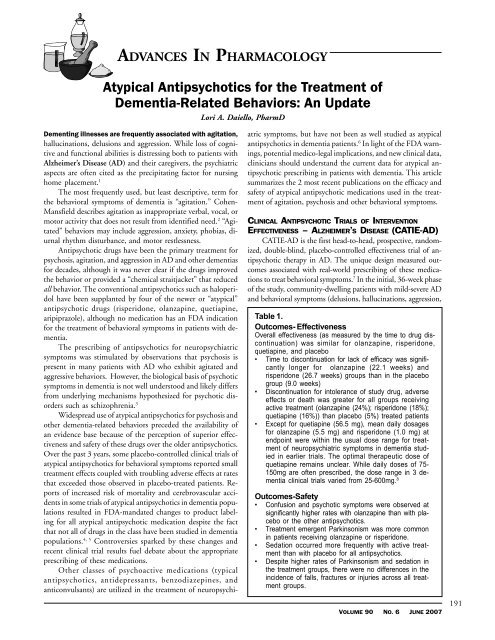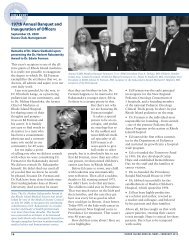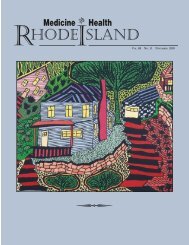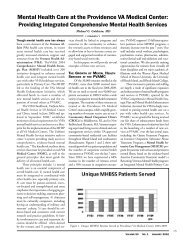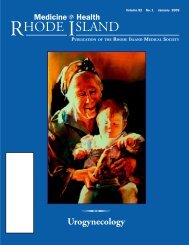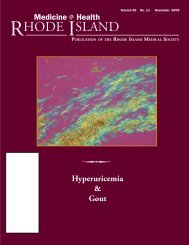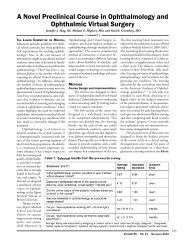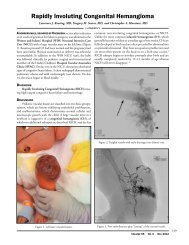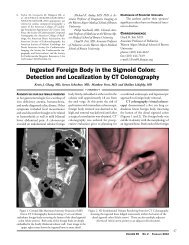June, No.6 - Rhode Island Medical Society
June, No.6 - Rhode Island Medical Society
June, No.6 - Rhode Island Medical Society
Create successful ePaper yourself
Turn your PDF publications into a flip-book with our unique Google optimized e-Paper software.
ADVANCES IN PHARMACOLOGYAtypical Antipsychotics for the Treatment ofDementia-Related Behaviors: An UpdateLori A. Daiello, PharmDDementing illnesses are frequently associated with agitation,hallucinations, delusions and aggression. While loss of cognitiveand functional abilities is distressing both to patients withAlzheimer’s Disease (AD) and their caregivers, the psychiatricaspects are often cited as the precipitating factor for nursinghome placement. 1The most frequently used, but least descriptive, term forthe behavioral symptoms of dementia is “agitation.” Cohen-Mansfield describes agitation as inappropriate verbal, vocal, ormotor activity that does not result from identified need. 2 “Agitated”behaviors may include aggression, anxiety, phobias, diurnalrhythm disturbance, and motor restlessness.Antipsychotic drugs have been the primary treatment forpsychosis, agitation, and aggression in AD and other dementiasfor decades, although it was never clear if the drugs improvedthe behavior or provided a “chemical straitjacket” that reducedall behavior. The conventional antipsychotics such as haloperidolhave been supplanted by four of the newer or “atypical”antipsychotic drugs (risperidone, olanzapine, quetiapine,aripiprazole), although no medication has an FDA indicationfor the treatment of behavioral symptoms in patients with dementia.The prescribing of antipsychotics for neuropsychiatricsymptoms was stimulated by observations that psychosis ispresent in many patients with AD who exhibit agitated andaggressive behaviors. However, the biological basis of psychoticsymptoms in dementia is not well understood and likely differsfrom underlying mechanisms hypothesized for psychotic disorderssuch as schizophrenia. 3Widespread use of atypical antipsychotics for psychosis andother dementia-related behaviors preceded the availability ofan evidence base because of the perception of superior effectivenessand safety of these drugs over the older antipsychotics.Over the past 3 years, some placebo-controlled clinical trials ofatypical antipsychotics for behavioral symptoms reported smalltreatment effects coupled with troubling adverse effects at ratesthat exceeded those observed in placebo-treated patients. Reportsof increased risk of mortality and cerebrovascular accidentsin some trials of atypical antipsychotics in dementia populationsresulted in FDA-mandated changes to product labelingfor all atypical antipsychotic medication despite the factthat not all of drugs in the class have been studied in dementiapopulations. 4, 5 Controversies sparked by these changes andrecent clinical trial results fuel debate about the appropriateprescribing of these medications.Other classes of psychoactive medications (typicalantipsychotics, antidepressants, benzodiazepines, andanticonvulsants) are utilized in the treatment of neuropsychiatricsymptoms, but have not been as well studied as atypicalantipsychotics in dementia patients. 6 In light of the FDA warnings,potential medico-legal implications, and new clinical data,clinicians should understand the current data for atypical antipsychoticprescribing in patients with dementia. This articlesummarizes the 2 most recent publications on the efficacy andsafety of atypical antipsychotic medications used in the treatmentof agitation, psychosis and other behavioral symptoms.CLINICAL ANTIPSYCHOTIC TRIALS OF INTERVENTIONEFFECTIVENESS – ALZHEIMER’S DISEASE (CATIE-AD)CATIE-AD is the first head-to-head, prospective, randomized,double-blind, placebo-controlled effectiveness trial of antipsychotictherapy in AD. The unique design measured outcomesassociated with real-world prescribing of these medicationsto treat behavioral symptoms. 7 In the initial, 36-week phaseof the study, community-dwelling patients with mild-severe ADand behavioral symptoms (delusions, hallucinations, aggression,Table 1.Outcomes- EffectivenessOverall effectiveness (as measured by the time to drug discontinuation)was similar for olanzapine, risperidone,quetiapine, and placebo• Time to discontinuation for lack of efficacy was significantlylonger for olanzapine (22.1 weeks) andrisperidone (26.7 weeks) groups than in the placebogroup (9.0 weeks)• Discontinuation for intolerance of study drug, adverseeffects or death was greater for all groups receivingactive treatment (olanzapine (24%); risperidone (18%);quetiapine (16%)) than placebo (5%) treated patients• Except for quetiapine (56.5 mg), mean daily dosagesfor olanzapine (5.5 mg) and risperidone (1.0 mg) atendpoint were within the usual dose range for treatmentof neuropsychiatric symptoms in dementia studiedin earlier trials. The optimal therapeutic dose ofquetiapine remains unclear. While daily doses of 75-150mg are often prescribed, the dose range in 3 dementiaclinical trials varied from 25-600mg. 8Outcomes-Safety• Confusion and psychotic symptoms were observed atsignificantly higher rates with olanzapine than with placeboor the other antipsychotics.• Treatment emergent Parkinsonism was more commonin patients receiving olanzapine or risperidone.• Sedation occurred more frequently with active treatmentthan with placebo for all antipsychotics.• Despite higher rates of Parkinsonism and sedation inthe treatment groups, there were no differences in theincidence of falls, fractures or injuries across all treatmentgroups.VOLUME 90 NO. 6 JUNE 2007191


